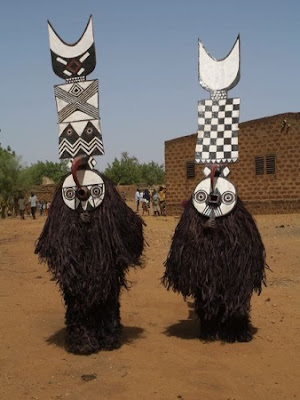Burkina Faso is regularly referred to as the ‘Capital of
African Film’. Fans, stars and film-makers travel to Ouagadougou for the 25th
FESPACO (Pan African Film and Television Festival of Ouagadougou), the biggest
and most popular African film event in the world. So, as we’re in Burkina Faso,
it seems only fitting to recommend films that can help prepare you for your
trip.
Le
Burkina Faso est régulièrement désigne comme la capital du film africain. Les
fans ,les stars et les cinéastes se rendent à Ouagadougou pour la 25e édition
du FESPACO(Festival Panafricain du Cinéma et de la Télévision de Ouagadougou),le
plus grand et le plus populaire festival de film africain au monde .Alors que
nous sommes au Burkina, il semble juste et approprie de recommander des films
qui peuvent vous aider a préparer votre
voyage.
1.
The Intouchables (2011) [French] /
If you’re French language skills are severely
lacking then watching a French film is a sure-fire way to becoming fluent (not
really). But either way this witty and poignant film, about an unlikely
friendship between a wealthy quadriplegic and his caretaker, is a perfect
introduction to French cinema.
Si
vous êtes français les compétences linguistiques sont très pénibles alors
regarder un film français est une façon sure de devenir fluide. De toute façon
ce film spirituel et poignant sur une amitié improbable entre un quadriplégique
riche et son gardien est une introduction parfaite au cinéma français.
2. Thomas Sankara: The Upright Man (2006) [English]/ Thomas
Sankara: L’Homme droit (2006)
The late president of Burkina Faso, Thomas
Sankara – an icon for many young Africans in the 1980s – remains to many an
African hero. This documentary offers a filmic account of Sankara’s rise,
governing style, his reforms and eventual murder. Through this film, it’s clear
to see why Sankara is both ‘an African and World treasure.’
Thomas Sankara une icône pour de nombreux jeunes Africains dans les années
1980 demeure pour beaucoup un héros africain. Ce documentaire offre un récit
filmique de la montée de Sankara, son style de gouvernance, ses reformes et l’éventuel
meurtre. A travers ce film il est clair de voir pourquoi Sankara est à la fois
un africain et un trésor du monde.
3. Masks of Burkina Faso (2003) [English] /
Many people of Burkina Faso continue to
create beautiful and intricate masks that are used in funerals, initiations and
other important occasions in the annual cycle of family life. These masks are often carved from the soft
and fine-grained ceiba tree. Furthermore, they’re coated in white (made from
the excrement of lizards) and black (made from powdered charcoal and egg
binder) pigment. This film includes historic footage of masks from the Mossi,
Bwa, Bobo and Nuna (Gurunsi) people.
Beaucoup de gens du Burkina Faso continue de créer des masques magnifiques
et complexes qui sont utilisés dans les funérailles, les initiations et
d’autres occasions importantes dans le cycle annuel de la vie familiale. Ces
masques sont parfois sculptés dans le Ciba doux et à grains fins. En outre-t-il
sont enduit en pigments blancs et noirs. Ce film comprend des images
historiques de masques des populations Mossi, Bwa, Bobo et Nuna (Gurunsi).
4. Wend Kuuni (God’s Gift) (1982) / Wend Kuni (Don de Dieu) (1982)
Directed by the legendary Gaston
Kabore, ‘Wend Kuuni’ is a fable-like drama set amongst the traditional villages
of Burkina Faso before the rise of industrialization where a travelling peddler
finds a mute boy. This heartwarming film follows this boy’s journey as he
regains his speech and eventually provides the narrative for the story.
Dirige par le légendaire Gaston Kabore « Wenduni » est une fable
comme un drame dans le village traditionnel du Burkina Faso avant la monte de l’industrialisation
ou un colporteur voyageur trouve un garçon muet. Ce film réconfortant
accompagne le voyage de ce garçon alors qu’il retrouve la parole et finit par
fournir le discours de cette histoire.
5. Princess Yennega (1986) [French] / Princesse Yennega
Yennega was an African princess who lived
over 900 years ago. She was known as a brave warrior and was famous for her
strong spirit. Today, she is considered the mother of the Mossi people and has
become a cultural icon. This animated film, directed by Claude Le Gallou, dramatizes
the struggle for power between the Mossis and their enemies, the Nioniosses.
The stallion, her power animal, is an
important symbol which is awarded as prize to the winners of FESPACO.
Yennega
était une princesse africaine qui vivait-il y a plus de 900 ans. Elle était
connue comme une guerrière courageuse et était célèbre pour son esprit fort.
Aujourd’hui, elle est considérée comme la mère du peuple mossi et est devenue
une icône culturelle. Ce filme anime, réalisé par Claude Le Gallou, dramatise
la lutte pour le pouvoir entre les
Mossis et leurs ennemis, Nioniosses. L'étalon, son animal de puissance, est un
symbole important qui est décerné comme prix aux gagnants de FESPACO.





No comments:
Post a Comment